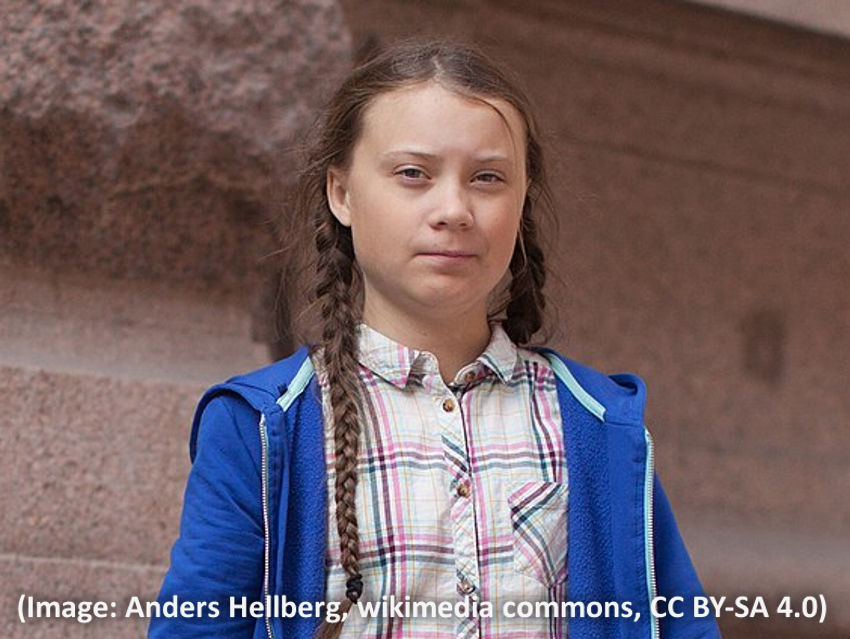Greta Thunberg has been named Time magazine’s Person of the Year for 2019. The magazine started this tradition in 1927 as “Man of the Year” recognizing the person who “for better or for worse … has done the most to influence the events of the year”. Last year, Time magazine named murdered and imprisoned journalists, calling them “The Guardians”, as Person of the Year. Previous candidates include Charles Lindbergh in 1927 for the first solo transatlantic flight, Mahatma Gandhi in 1930, Wallis Simpson (first women) in 1936 for her relationship with King Edward VIII which led the British king to abdicate his throne to marry her, David Hoin in 1996 for pioneering work on AIDS research, Jeff Bezos in 1999 for founding and managing of Amazon.com. The 16-year-old Greta is the youngest person to be chosen by the magazine.
Greta
When Greta was 11 years old, she became very sad about climate change and temporarily stopped speaking. In August 2018, Greta Thunberg started spending school days outside the Swedish parliament to call for stronger action on global warming. A year later Greta’s speeches are known worldwide, and her protests inspired the Friday for Future protests. This is a global movement of (school) students who take time off from class to demonstrate to request action to prevent further global warming and climate change. On September 20, 2019, a Global Climate Strike joined by 4 million people was inspired by Greta’s protests and she spoke to hundreds of thousands of people in New York, USA.
Greta has Asperger syndrome. She says it “sometimes makes me a bit different from the norm” and she sees being different as a “superpower”. Greta once said that Rosa Parks, the civil rights activist, is a role model and inspiration to her. In the 1950s, Rosa sparked a civil rights movement that improved the lives and treatment of millions of African Americans.
Opinions
Opinions about Greta Thunberg are controversial. For many, she is particularly effective at communicating the need for urgent action. They get inspired by her words and passion. “According to the Intergovernmental Panel on Climate (IPCC), we are less than 12 years away from not being able to undo our mistakes.”, Greta says. “We have run out of excuses and we are running out of time.” “We [her generation] are not the ones who are responsible for this, but we are the ones who have to live with these consequences, and that is so incredibly unfair,” she said at some point.
Others criticize the personalized movement taking advantage of an indoctrinated child. Where are Greta’s parents to protect her 16-year-old child saying: “I shouldn’t be up here. I should be back in school on the other side of the ocean.”
Time and again, Greta calls us scientists into the duty. In her speech in Brussels in February 2019, Greta said: “We want politicians to listen to the scientists”. And at the EU Parliament in Strasbourg in April 2019: “You don’t have to listen to us, but you do have to listen to the United science, the scientists. And that is all we ask, just unite behind the science!”
Scientists
Without question, we scientists have to think about what we and what chemistry can and must do for future generations. We can take Greta’s will power as a model. We must ask politicians uncomfortable questions, make our knowledge available, speak in a way that the general public can understand, etc. These days a strong stance not only on the current state of research but also on important topics from society is needed. Talking alone is not enough to protect the environment. It is clear that chemistry contributes to the problem, but also that without chemistry there will be no solution. And chemistry certainly has a lot to offer to understand the problems and how to solve them. It is our task to fill this with life.
Greta warned at the UN Climate Summit, New York, 23 September 2019 “The eyes of all future generations are upon you. And if you choose to fail us, I say – we will never forgive you.” Or as the book author Jonathan Safran Foer put it “Will future generations distinguish between those who didn’t believe in the science of global warming and those who said they accepted the science but failed to change their lives in response?”.
- Charlotte Alter, Suyin Haynes, Justin Worland, TIME 2019 Person of the Year Greta Thunberg, TIME 2019.
- Greta Thunberg’s Speeches,
- Jonathan Safran Foer, We Are the Weather: Saving the Planet Begins at Breakfast 2019.




